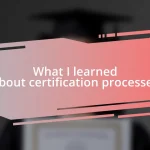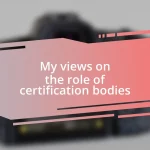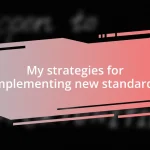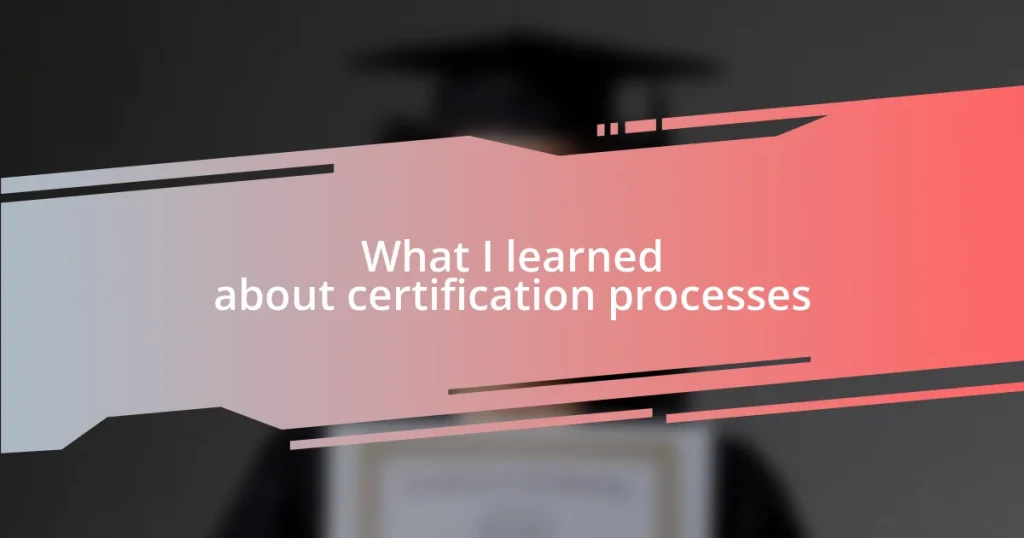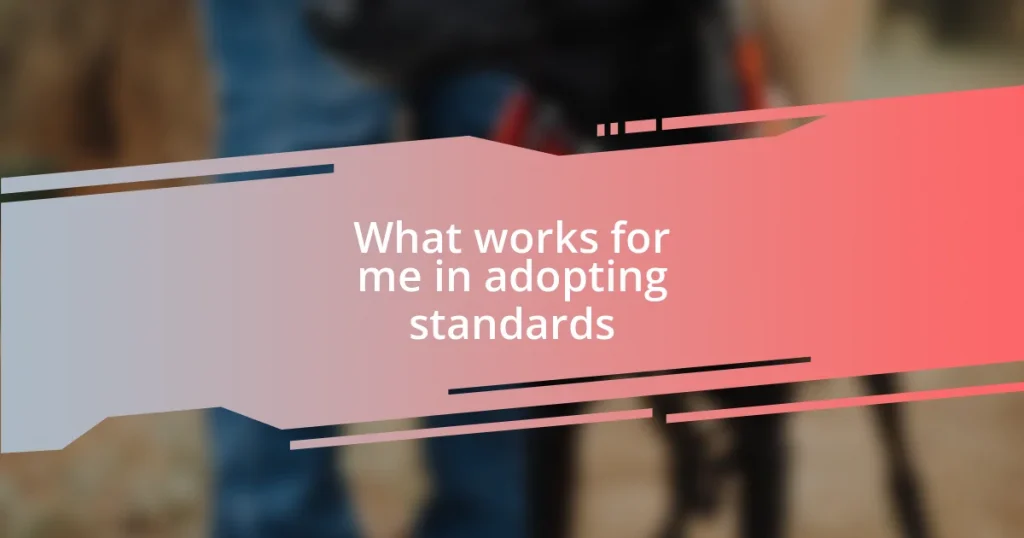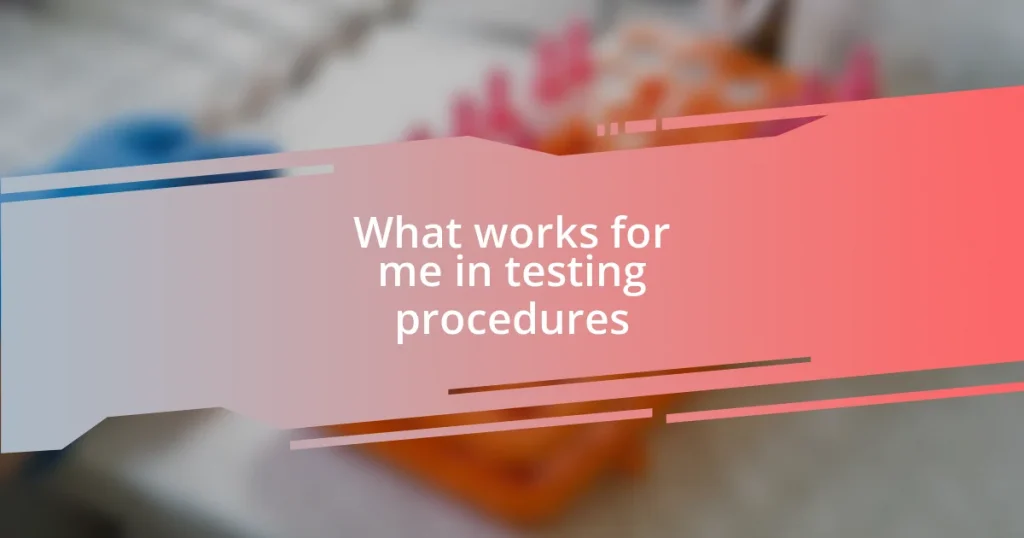Key takeaways:
- Certification processes involve studying, testing, and ongoing education, which not only enhance knowledge but also build confidence and professionalism.
- Successfully navigating the certification journey opens up new career opportunities, increases earning potential, and fosters a supportive community through shared experiences.
- Effective preparation strategies, such as diverse study materials and goal setting, alongside maintaining certifications through ongoing education and community engagement, are crucial for long-term success.
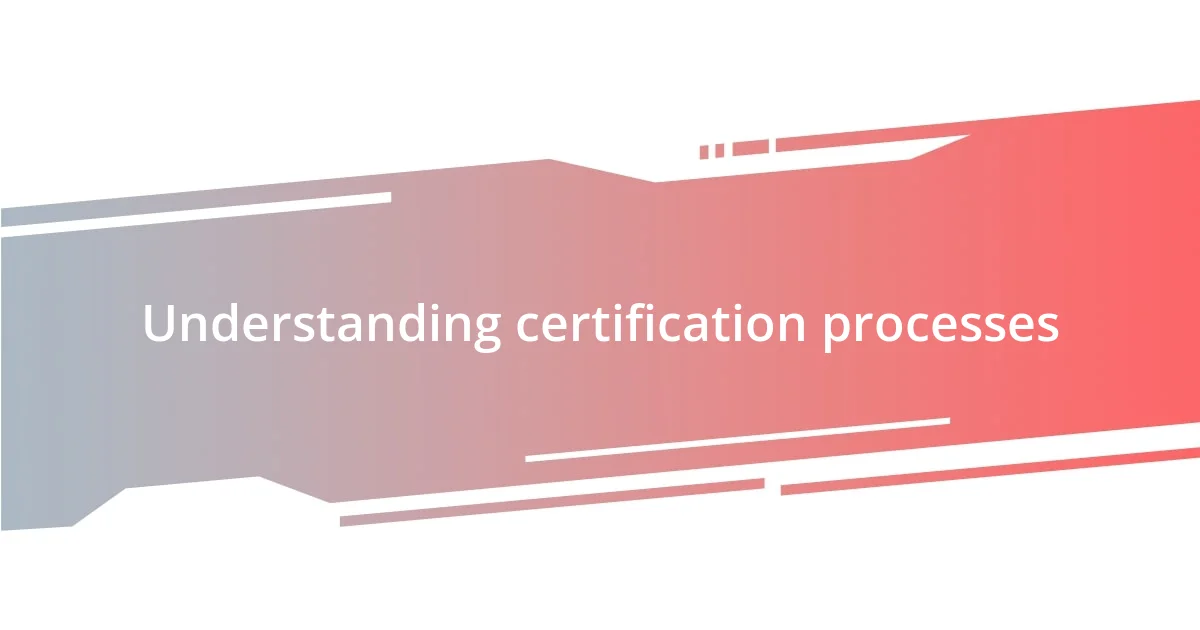
Understanding certification processes
Understanding certification processes can often feel overwhelming, especially when you’re unsure of what’s required. I still remember my own experience with obtaining a certification; it was daunting at first, but with each step, I gained more confidence and clarity. Have you ever pondered how these processes shape our professional journeys?
The core of a certification process usually involves several key components: studying, testing, and practical application. When I tackled a particularly challenging certification, I found that the exam wasn’t just about rote memorization; it was about truly understanding the concepts behind the knowledge. Isn’t it fascinating how much we learn not only from the tests but from the preparation itself?
Moreover, these processes often include ongoing education to maintain certification, which can feel like a never-ending cycle. I’ve had moments where I questioned my commitment—was it worth the time and effort? But reflecting on those moments now, I’ve realized that the continuous learning aspect not only keeps my skills sharp but also fuels my passion for my field. Doesn’t that make the effort worthwhile?
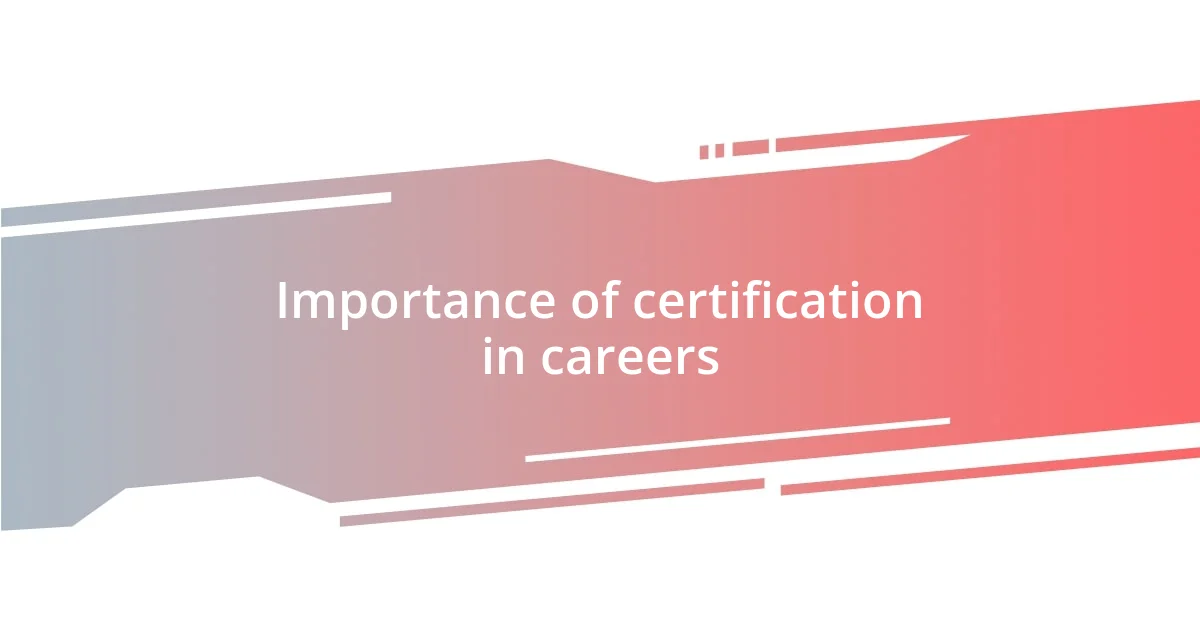
Importance of certification in careers
When I think about the significance of certification, I can’t help but recall the moments of sheer excitement when I initially received mine. Each new certification I earned became a stepping stone, elevating my career options and instilling a sense of credibility in my professional identity. It’s hard to overstate how certifications can enhance not just knowledge but also self-assurance, making me feel more competent in my abilities.
- Certifications serve as concrete proof of expertise, reassuring employers of a candidate’s skills.
- They open doors to new job opportunities and career advancements.
- Continuing education requirements help ensure that I stay current with industry trends and developments.
I’ve also noticed how certification can dramatically increase networking possibilities. The shared experiences and common struggles with fellow learners foster a bond that extends beyond mere job hunting; it creates a community of professionals. It’s refreshing to meet others who understand the challenges and victories that come with the certification journey. That sense of belonging adds an invaluable layer to professional growth.
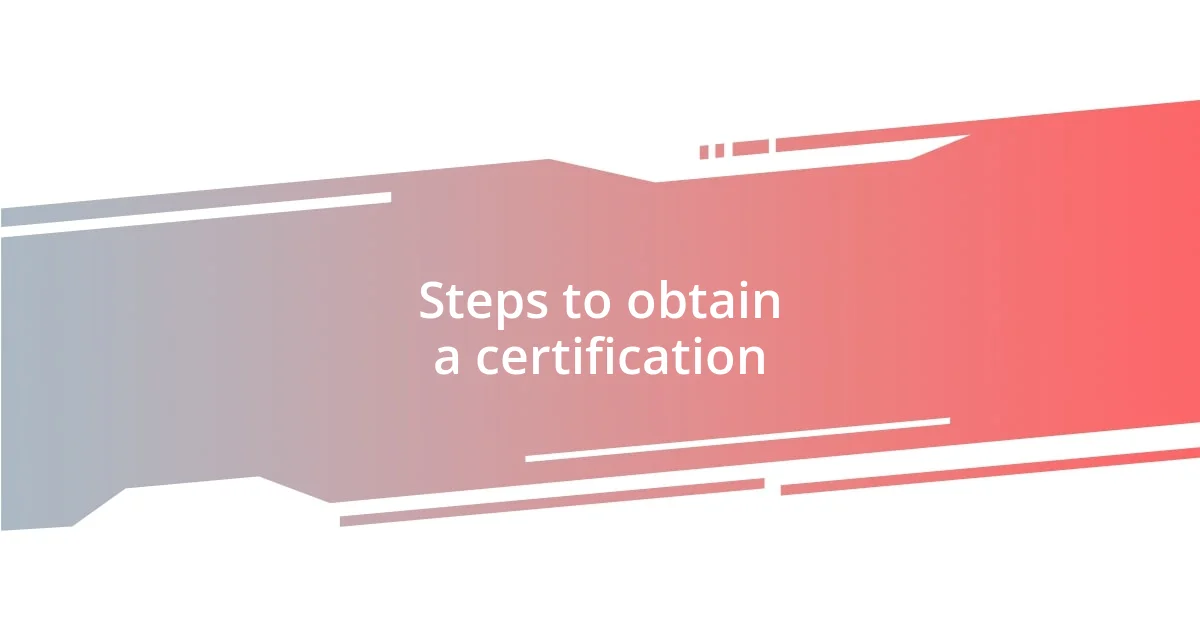
Steps to obtain a certification
To obtain a certification, one usually starts by identifying the specific certification that aligns with their career goals. In my case, I had to weigh options carefully, considering not just the content but also how recognized each certification was in my industry. This preliminary step is crucial; having clarity on what you want sets a solid foundation for the entire process.
Next comes the preparation phase, which for me felt like embarking on an exciting adventure. I set up a study schedule, gathering resources like textbooks, online courses, and practice exams. The sense of accomplishment when I completed a difficult section was exhilarating, reminding me of the progress being made. Doesn’t setting up a plan and seeing it come to life energize you?
Finally, the application and examination part can be nerve-racking, but it’s also incredibly rewarding. I’ll never forget the moment I clicked ‘submit’ on my exam. It felt like a release of all the built-up tension from months of studying. The wait for the results can be excruciating, but it’s a critical step in the certification journey that ultimately leads to invaluable growth.
| Step | Description |
|---|---|
| Identify Certification | Choose a certification that aligns with your career goals. |
| Preparation | Gather resources and create a study plan for effective learning. |
| Application & Exam | Submit your application and complete the examination process. |
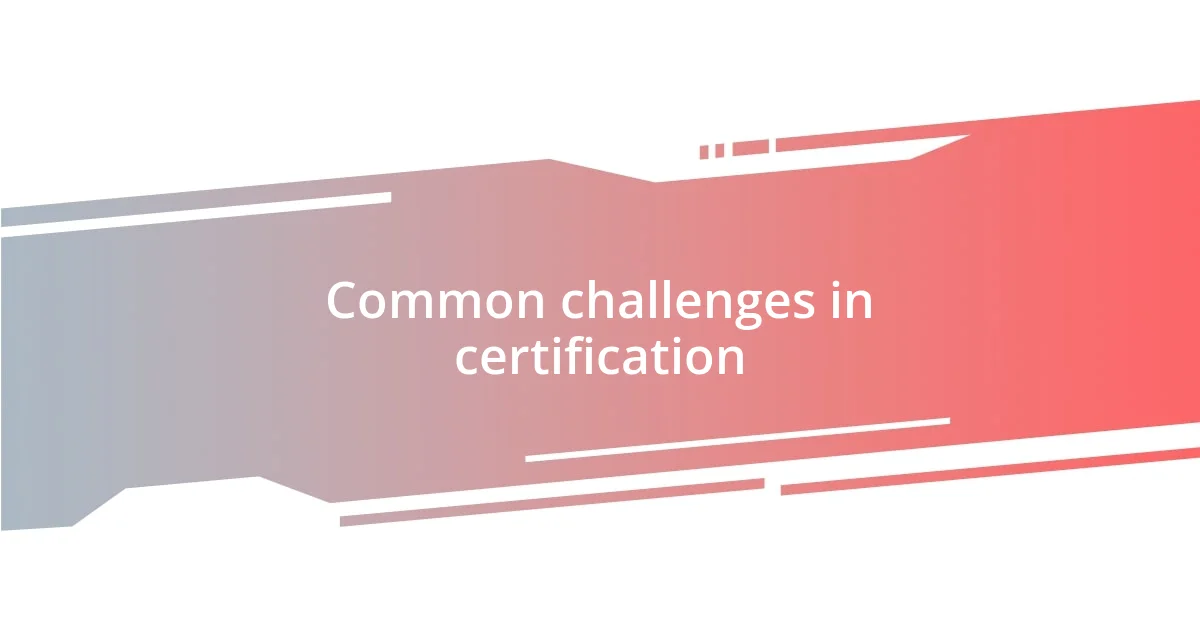
Common challenges in certification
Navigating the certification process can unveil several challenges, and one that stands out to me is the sheer amount of information one must absorb. When I was preparing for my first certification exam, I felt overwhelmed by the vast syllabus. It’s easy to question, “How will I ever remember all this?” But breaking down the material into manageable chunks really helped me—this strategy was a game-changer.
Another significant hurdle lies in time management, particularly for those balancing work, family, and study commitments. I remember trying to carve out study time amidst my busy schedule; I often felt like I was juggling too many balls at once. Have you ever wondered how to prioritize effectively during such busy periods? What worked for me was blocking out specific times in my calendar dedicated solely to study, turning that time into an unmovable appointment, much like a work meeting.
Finally, there’s the psychological pressure that can accompany the certification process. The fear of failure can be daunting, especially when so much is at stake. I experienced this firsthand before my exam, where I found myself questioning my abilities. I learned that sharing these concerns with colleagues or friends brought a sense of relief; it made me realize that I wasn’t alone in feeling this way. Having that support system was crucial, as it transformed those feelings of isolation into camaraderie.
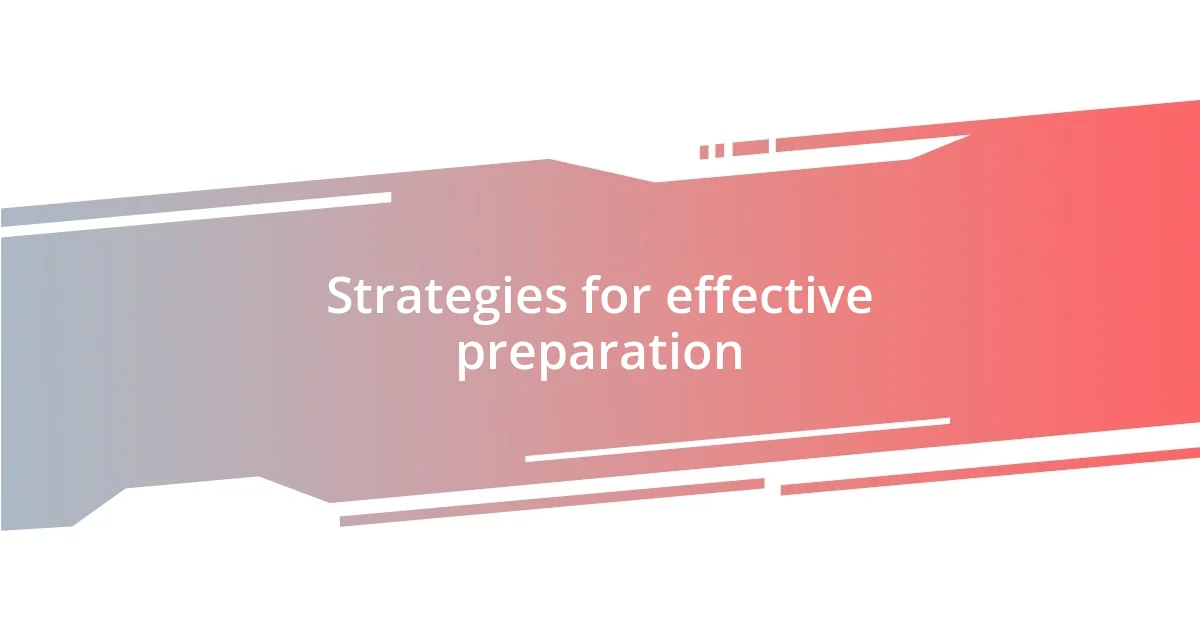
Strategies for effective preparation
One of the most effective strategies I found in preparing for certification was the use of diverse study materials. I learned that combining textbooks with video lectures and interactive quizzes catered to different learning styles, which kept my engagement high. Can you remember a time when a different approach made something click for you? For me, discovering how to use flashcards was a revelation; it turned tedious memorization into a fun, bite-sized challenge, allowing me to review on the go.
Setting clear, achievable goals is another cornerstone for effective preparation. Early on, I made a practice of breaking down the material into weekly targets, celebrating small victories along the way. I vividly recall reaching the halfway mark in my study schedule and treating myself to a nice dinner—I realized that acknowledging progress helped maintain my motivation. When was the last time you rewarded yourself for an achievement? It’s a simple yet powerful way to inject some joy into the process.
Additionally, creating a study group was transformative for me. There’s a unique energy that comes from discussing concepts with peers; it not only deepens understanding but also fosters accountability. I remember the lively debates we’d have over complex topics, and how clarifying my thoughts for others often solidified my own knowledge. Have you considered teaming up with others? It builds not just knowledge, but connections that can be supportive during challenging times.
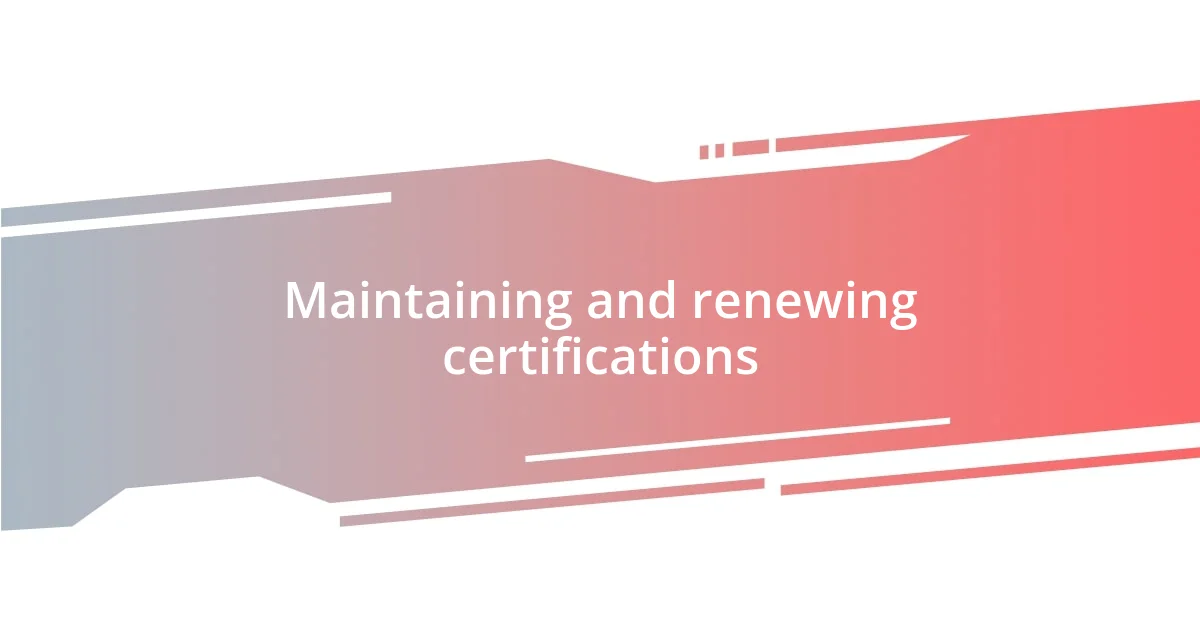
Maintaining and renewing certifications
Maintaining and renewing certifications is an essential part of staying relevant in any field. I learned that keeping track of renewal dates can be a bit of a juggling act. I once missed a deadline because I thought I had another month, which sent me into a mini panic! Now, I use reminder apps, scheduling alerts well in advance, so I can avoid that stress altogether. Have you found a method that helps you stay organized?
As I delved deeper into the subject, I discovered that ongoing education is often a requirement for renewal. This can take many forms, from formal courses to attending workshops. I vividly recall choosing to attend a weekend workshop that not only counted toward my renewal credits but also reignited my passion for my field. Attending events like these can provide refreshing perspectives and a chance to network, which is a bonus we shouldn’t overlook.
Lastly, I found community engagement to be incredibly rewarding when it comes to maintaining certifications. Volunteering in professional associations connected me with like-minded peers and energized my commitment to continuous learning. Was there ever a time when being part of a community helped you push through? For me, it was at our local chapter meetings where I shared insights and learned from others, making the process feel less like a chore and more like an opportunity for growth.
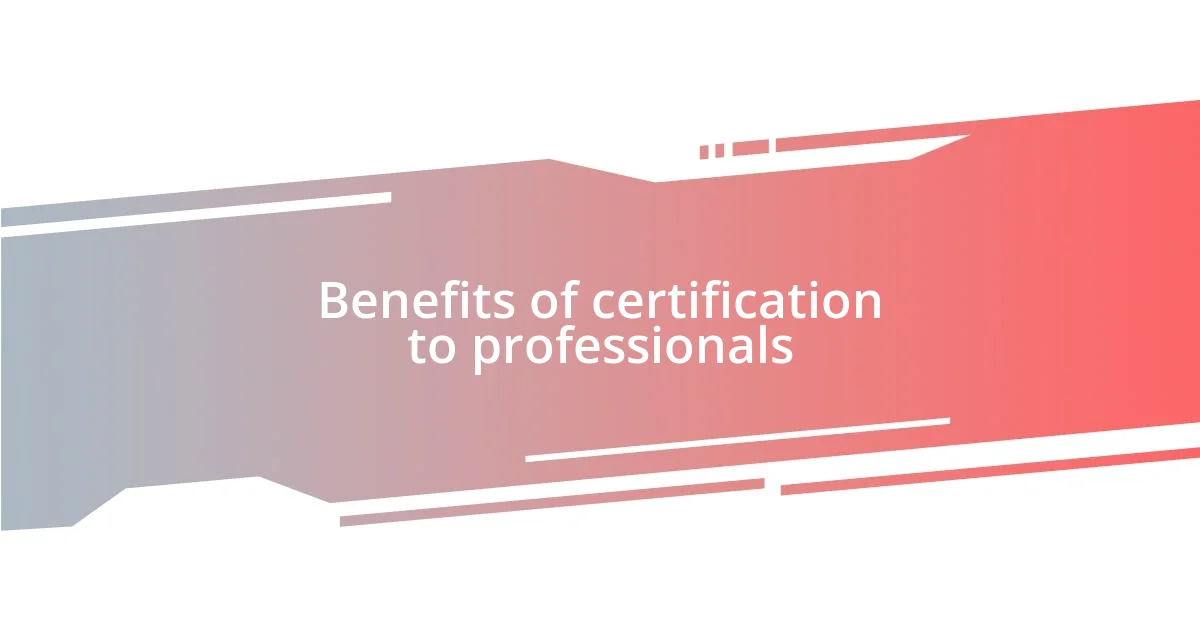
Benefits of certification to professionals
One of the greatest benefits of certification to professionals is the boost in confidence it provides. I recall the first time I displayed my certification badge on my LinkedIn profile; it changed the way I viewed my capabilities. There’s something empowering about officially recognized competence, isn’t there? It felt like I was not just claiming expertise, but effectively showcasing it to potential employers and clients.
Furthermore, certifications can significantly enhance career progression. In my experience, having a certification often acted as a differentiator in competitive job markets. I remember applying for a position where many candidates had similar skill sets, but my certification landed me an interview. It’s fascinating how a piece of paper can open doors that, without it, might have remained closed.
Lastly, being certified can lead to increased earning potential. Statistics often highlight a salary boost tied to certification, and I can personally attest to this phenomenon. After getting certified, I negotiated a raise during my performance review, armed with data that showed how valued certified professionals are in our industry. Isn’t it amazing how investing in oneself can yield financial benefits? I truly believe that certifications not only validate our skills but also serve as catalysts for professional growth and success.


